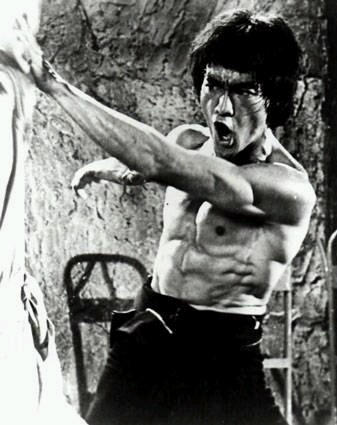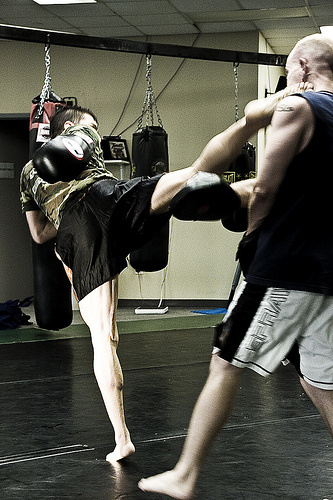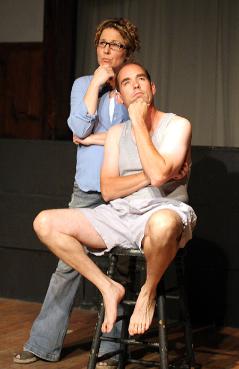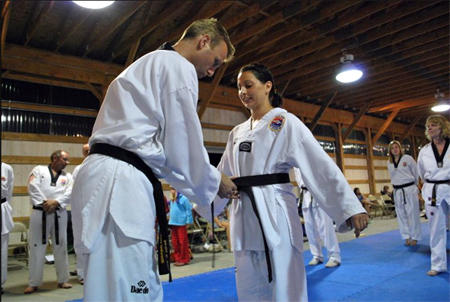This is the second post in the “Writing and the Martial Arts” series, this post from Steve Bein. For more on this series and on Steve, see the first post: “Writing and Martial Arts 1: How Do You Like Your Chances?”
 Bruce Lee said that before he started martial arts, he thought a punch was just a punch. Then, having begun his training, he realized a punch was not just a punch. Then, having mastered the art, he understood a punch was just a punch.
Bruce Lee said that before he started martial arts, he thought a punch was just a punch. Then, having begun his training, he realized a punch was not just a punch. Then, having mastered the art, he understood a punch was just a punch.
Now you may say this sounds like advice from Yoda. You may say it’s as inscrutable as a Zen koan. And if you said that, you wouldn’t be far wrong; Bruce cribbed this from Zen Buddhism (in the Buddhist version it’s a mountain, not a punch, that needs to be understood), and as it happens, Yoda was first conceived as a Buddhist and Daoist master (Dagobah, where he lives, is the name of a Tibetan style of pagoda, a sacred structure in both Buddhism and Daoism). But what I want to take from it here is a comparison with writing.
Before I started writing, I thought writing was just writing. That is, I thought all you did was sit down and type, and then you’d have a story. There’s an episode of Californication where Hank Moody’s childhood friend voices this view on writing: “I can’t believe you get paid to just sit around and make stuff up.” The uninitiated in the martial arts have a similar view on punching: just ball up your fist and whack somebody with it.
They’re wrong about that. I’ve told my martial arts students many times that if you spent a year working on nothing but your jab, it wouldn’t be a wasted year. People who don’t want to waste time studying the punch end up breaking their hands. Their punches are slow, sloppy, and without power. They punch from the shoulder, not from the toes, and worse yet, they can’t even understand what it means to punch from the toes.
In my opinion, the same goes for sitting down to write without any sense of the art. It’s an old adage that stories amount to interesting characters with difficulties. But how do you invent an interesting character? How do you find the difficulty that is hardest for this specific character, yet one that this specific character is best suited to solve? How do you make a reader care about solving this difficulty? For that matter, how do you get readers to flip to the next page so they’ll even find out what the difficulty is?
None of that stuff comes naturally. Every writer must go through a phase in which writing is not just writing. If that weren’t true, little kids’ stories would be interesting. But they’re not—at least not to anybody but their parents. Little kids’ stories go, “This happened and then this happened and then this happened.” Good stories go, “This happened because this happened, and because of those, this happened.” And when they say, “this happened,” what that really means is, “this difficult thing happened to this interesting person, and it turned that person’s world upside down, and now all of us really want to know how this person is going to set things right.”
A good story generates both tension and a sense of inevitability. There is a causal connection between act two and act one, and enough suspense generated in act one to leave readers no choice but to read act two. And that’s something we need to learn, and practice, and practice again until we get it right.
My process for this is a lot like my martial arts training. In jiujitsu, for example, you’ve got strategy and tactics, you’ve got practice in technique, and you’ve got actual sparring. Anyone who lacks the patience for the first two gets dominated in the third one. At 170 pounds, I’ve tapped 400-pounders because they didn’t have technique and they didn’t have a game plan.
In writing, the strategic and tactical phase—for me, anyway—is a lot of free-form scribbling just to figure out what story I want to tell. In the practice phase I create an outline for the story. Sometimes this is short; other times it’s quite elaborate. (My longest outline to date was 41 pages.) The sparring phase is the actual writing itself, and then the editing, and then editing again, doing it over and over again until I’ve got it right—exactly like jiujitsu, or kickboxing for that matter, or any other art I’ve ever trained in.
In jiujitsu, sometimes technique fails me and I have to come up with something on the fly. In writing, sometimes the outline fails me and I need to take it in a different direction. In jiujitsu, when I get into a jam where the technique I learned isn’t working, I always want to get a technique that will work better. In writing, when I get into a jam where the story I outlined is losing tension, I always want to start a new outline that ratchets up the tension again. And both in jiujitsu and in writing, the most important phase is the first: understanding exactly what I want to achieve, so that my practice and my execution lead to the kind of results I want.
I’m a better kickboxer than a jiujitsu player. Part of that is due to body type—I’m tall and lanky, and at my best when I can keep an opponent at a distance—but most of it is due to the fact that in jiujitsu I’m still at a point where I have to memorize techniques and apply them. That hasn’t been true for me in kickboxing for years. The fight just flows. I know what it takes to make an opponent open his guard, and I know what it takes to keep him from advancing. For me, kickboxing is just kickboxing. There’s no memorization. Show me something new even once and I can do it. Jiujitsu is not just jiujitsu for me; show me something new and I need to practice it a dozen times right now, and then again at the beginning of the next class, or else I’m certain to lose it.
I’m not at a phase where writing is just writing either. I used to believe that no writer can get there. Now I believe otherwise. In On Writing, Stephen King says he doesn’t outline at all, nor does he formulate a game plan in advance. He just thinks of interesting characters and then watches what they do. Harlan Ellison says he writes the same way. If we take them at their word, then for them writing is just writing.
I am still looking for the magic formula that will allow me to do what they do. I don’t particularly enjoy laboring over every story. I don’t like doing all that free-form scribbling in advance just to throw it away and start anew. I don’t like following an outline only for it to lead me to a dead end. I also don’t like the process of memorizing one jiujitsu technique after another, just to get tapped because the technique came to mind a tenth of a second too late.
Here’s the bitch of it: there is no magic formula. There is only time served. There is only doing it, and doing it again, and doing it again. Sooner or later I will either make myself a good jiujitsu player or I will get so old that my body can’t do it anymore. And sooner or later I will either keel over dead or I will discover how to spontaneously create interesting characters, line by line tension, three act structure, and all the rest of it.
I wish I could tell you how. I can’t. For me writing is not just writing. Not yet.







 To see what I have to say about talent, read my posts “
To see what I have to say about talent, read my posts “

